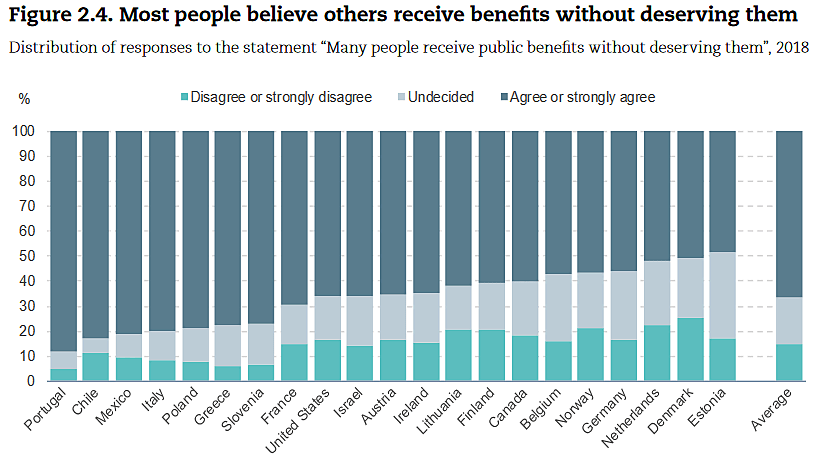The OECD has released results from a survey of 22,000 people in 21 countries regarding their views of government social programs.
Governments in the high-income OECD countries hand out more subsidies than ever, yet many people feel that they are not getting what they want. The OECD survey finds, “There is clear dissatisfaction with existing social policy. Across the surveyed countries, many respondents believe public services and benefits are inadequate and hard to reach.” And the survey finds, “More than half of respondents say they do not receive their fair share of benefits given the taxes they pay.”
Those responses make it sound like people may want a bigger welfare state. But other responses show that people don’t believe that the existing welfare state works very well. Two-thirds of the OECD respondents think, “Many people receive public benefits without deserving them,” as shown in the chart below. And 60 percent across the OECD think that “government does not incorporate the views of people like them when designing social policy.”
In my study of government failure, I found that even as the U.S. government has vastly expanded social programs, the public has not grown fonder of the government, but rather has become more alienated. Public polls show that the share of people who trust the federal government has plunged from about 70 percent in the 1960s to about 20 percent today. Today, about 80 percent of Americans are “angry” or “frustrated” by the federal government, according to Pew. Americans have grown less fond of the government even as the number of programs ostensibly created to help them has increased.
What seems to be going on is that politicians relentlessly propagate myths that the government should coddle the citizenry and that it can do so efficiently. They propagate an expansive public interest theory of government. But actual government programs are inefficient, wasteful, and often counterproductive, which the public choice theory of government better describes. Government realities are different than government dreams.
Governments overpromise and underdeliver, and that seems to underlie the dissatisfaction coming through in these polls.

